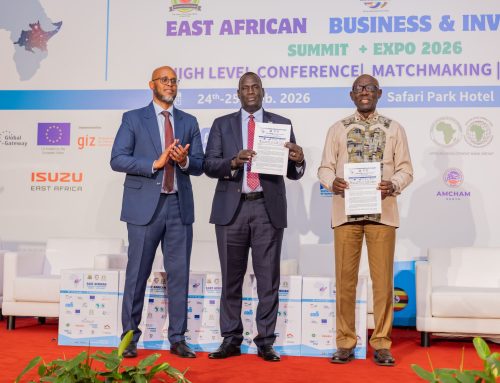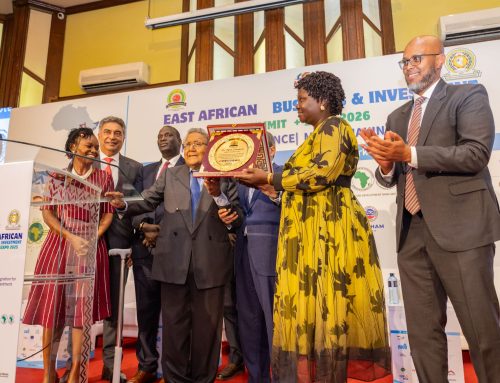Summary of the assignment:
| Nature of assignment | Short term |
| Location | Will vary depending on the respondents |
| Timeframe | 21 working days |
| Reporting | To Executive Director/CEO |
| Application close | 27th September 2022 at (5.00 p.m.) |
- BACKGROUND TO THE EABC TRADEMARK EAST AFRICA PROJECT
The East African Business Council (EABC) is the umbrella body of the Private Sector in the East African Community (EAC). It brings together national private sector umbrella bodies, manufacturers, employers, bankers, insurance and transporters associations, chambers of commerce, corporates, and medium and small enterprises from the entire East African region.
EABC’s mandate is to represent and promote the interests of the EAC business community, provide value-added services that enhance trade and competitiveness, and participate actively and positively in influencing legal and regulatory formulation to improve the business environment. EABC works with the major stakeholders such as the EAC Secretariat, Organs, Institutions and National Governments and provides input in policy discussion while advocating for the implementation of resolutions at the national level aimed at increasing intra-regional trade. For effective implementation of the Regional PPD programme, EABC was selected by TMEA as the lead implementing partner for the Private Sector Organizations.
TradeMark East Africa (TMEA) is a multi-donor funded, not-for-profit organisation, established in 2010 to promote regional trade and prosperity in East Africa. TMEA combines a regional approach with national-level interventions and works closely with East Africa institutions (e.g., East African Community EAC Secretariat, Corridors Authorities), national governments, and private sector and civil society organisations. TMEA has its headquarters in Nairobi – Kenya with branches in Burundi, Rwanda, South Sudan, Tanzania, Uganda, and The Democratic Republic of Congo (DRC). TMEA has recently revised its strategic focus in line with national, regional, and global priorities as defined in its new corporate strategy (2017 – 2023). The revised Theory of Change (TOC) is anchored on two strategic objectives: (i) Reduced Barriers to Trade; and (ii) Improved Business Competitiveness. Under the improved business competitiveness, strategic objective is TMEA’s Public-Private Dialogue (PPD) for trade and investment programme.
The East African Business Council (EABC) is implementing the TMEA project titled Public‐Private Sector Dialogue (PPD) for Trade and Investment in Eastern Africa. This is a regional project targets to mainstream advocacy throughout TMEA’s project clusters which are transport & logistics; customs & tax; standards & Sanitary Phyto Sanitary (SPS) Measures; African Free Trade Area (AfCFTA) & Tripartite Free Trade Area (TFTA) and Non-Tariff Barriers (NTBs). The programme’s core objective is to enhance Private Sector Organisations (PSOs) capacity to influence decision‐making proactively and positively, accelerate dispute resolution, sustain political buy‐in, increase commitment and reduce overall programme risks in TMEA’s project clusters. This will increase trade and investment in the EAC. The Regional Programme will contribute to core TMEA corporate results outlined below:
- Reduce transport (road, rail, and air) cost and time along transport corridors by 10% and increase efficiency in private sector logistics services provision
- Enhance Customs and other trade‐related agencies efficiency (25% reduction in time to process trade documentation) through integrated trade management systems and greater inter‐agency collaboration.
- Reduced tariffs, taxes, and levies by 5‐8% overall (including sub‐national) reduce exemption regimes, CET, and increase import/export tax incentives
- Enhanced efficiency of Bureaux of Standards, reduce related costs and time by 10%, reduce counterfeit and sub-standard goods by 20% through enhanced inter‐agency collaboration and improve private sector compliance.
- Resolve 30% of all reported NTBs along TMEA project clusters within a year.
- Catalyzing a 10% increase in exports annually, 93,000 direct jobs and $425m additional investment after seven years in targeted sectors in the EAC under the Compact and TLCs through increased investment incentives.
RATIONALE AND OBJECTIVE OF THE ASSIGNMENT
One of the EABC-TMEA project outcome is to strengthen institutional capacity for policy advocacy and organizational operations with an impact to reduce barriers to trade. The EAC integration process is marking 20 years in November 2019 since the signing of the Treaty, it is no doubt there have been a lot of achievements, opportunities and benefits from the EAC regional integration. However, there still exit challenges such as persistent NTBs hindering trade and investments in the EAC and potential risks that can harm the gains already accrued from the EAC regional integration process. Article 7 of the Treaty for the Establishment of the EAC states on people-centered and market-driven cooperation are principles to govern practical achievements of the objectives of the EAC integration process. Further Article 128 emphasizes on strengthening of the private sector as a key partner in the EAC integration.
Currently, at the EAC level, there is no formal framework developed by the private sector defining how East African private sectors act in relation to each other and third parties. This has probably hindered the private sector from effectively building coalitions and linkages to advocate and assert their rights as enshrined in the treaty, protocols and policies of the EAC. The relationship between EABC, EAC, NFPs, sectoral private sector associations and among each other as well as with regard to their members needs to be reinforced to improve advocacy. There have been several situations in the past that exist in which there were conflicting interests or jurisdictions making collaboration inefficient. EABC’s advocacy effectiveness, e.g., by tackling and monitoring advocacy issues more thoroughly, is hindered because of unclear structures between the key stakeholders.
In this regard, the rationale of this assignment will be to establish a mechanism by which the aforementioned issues will be resolved through a single common document and agreement, called East African Private Sector Charter. The Charter shall serve the purpose of aligning the different interests and jurisdictions of the key stakeholders.
The charter will highlight how the private sector within the EAC interrelate with each other as well as with the East African Community and Partner States and establish a permanent framework of collaboration that binds the stakeholders to specific actions, collective obligations, targets and timelines. The Charter will complement the Treaty for the establishment of the EAC, Observer Status, Consultative Dialogue Framework, existing dialogue frameworks and commitments. Furthermore, it will develop and implement a self-monitoring mechanism to ensure the implementation of collective obligations.
This shall be done by defining ‘who shall do what with whom in which scenario’. Hence, the Charter shall be the central document to provide stakeholders with guidelines on how to work together. This especially entails the demonstration of the following relationships and constellations: Between EABC and EAC, between EABC and NFPs, between NFPs and NFPs, between EABC and members, between EABC and respective national ministries, between EABC and development partners, between EABC and other stakeholders if identified as relevant.
The result shall be a document launched and endorsed by the Summit of the EAC Heads of State. The charter shall outline reforms to be implemented by different stakeholders and key results areas.
The consultant will work in partnership with EABC and its National Focal Points and sector associations in all the EAC Partner States. The main activities include; Working with EABC Executive Director and assigned programme staff to familiarize themselves with the private sector advocacy environment in the EAC, understanding how Business Membership Organizations (BMOs) operate and structure themselves including their relationship with EABC. Assess how private sector issues are channeled to the regional level and how the private sector.
The consultant should undertake the following duties:
i. Work closely with EABC Management, EABC National Focal Points and Sector Associations to identify and evaluate the challenges in daily advocacy work to be addressed by formulating the Charter;
ii. Analyze the EAC Private Sector Development and EABC Strategic Plan 2022-27 to inform the EAC Private Sector Charter
iii. Understand how Business Membership Organisations (BMOs) operate, and relate with EABC with intention of incorporating the relationships into the charter
iv. Asses how private sector issues are developed, and channeled to the regional level and how EABC harmonised the position for regional advocacy
v. Draw lessons from international best practices in developing the charter;
vi. Work with assigned programme staff to organize validation workshops and present the draft Charter to generate stakeholder comments for incorporation into the charter.
vii. Develop the EAC Private Sector Charter
4.0 DELIVERABLES
The key deliverables include:
• Inception report
• Draft EAC Private Sector Charter
• Final EAC Private Sector Charter as well as a report of the consultancy work
• Strategy to implement the EAC Private Sector Charter
5.0 QUALIFICATIONS AND EXPERIENCE
A suitable candidate should hold the following qualifications and key competencies:
- Academic and Professional Experience: A Master’s degree in, Economics, Business Administration, International Trade, Trade Policy and Law or any other relevant field is required.
- Work Experience: A minimum of four (04) years demonstrable experience working on Public and Private sector issues in the EAC region and knowledge of the working relationship between Private sector/Business Membership Organizations (BMOs) and the Public sector within the EAC;
- Knowledge of EAC Integration: Must demonstrate strong knowledge and appreciation of EAC integration and demonstrated experience of conducting similar assignments.
- Communication and Networking: Ability to communicate effectively, stakeholder identification & engagement, strong experience in developing the strategic plan and action plan for the private sector, especially for the EAC region.
- Languages: Fluency in oral and written English is required as it is the main EAC working language. Good working knowledge of French and Kiswahili will be an advantage.
- Additional Skills: Excellent computer skills (Microsoft Office (Word, PowerPoint, Excel), Email, analytical tools/software for data analysis, experience in working with internet searches, online databases, and data retrieval) are required.
- Nationality: The consultancy is only open to Nationals of any of the EAC Partner States, Burundi, Kenya, Rwanda, Tanzania, Uganda and South Sudan.
6.0 TECHNICAL & FINANCIAL EVALUATION CRITERIA
| Technical Evaluation: | Maximum |
| A minimum of four (04) years demonstrable experience working on Public and Private sector issues in the EAC region and knowledge on the working relationship between Private sector/Business Membership Organizations (BMOs) and the Public sector within the EAC; | 30 |
| Knowledge of EAC Integration: Must demonstrate strong knowledge and appreciation of EAC integration and demonstrated experience in conducting similar assignments. | 15 |
| Communication and Networking: Ability to communicate effectively, stakeholder identification & engagement, strong experience in developing the strategic plan and action plan for the private sector, especially for the EAC region. | 15 |
| Academic qualifications: A Master’s degree or postgraduate qualification in any of the following fields, Economics, Taxation/Customs, Business Administration, or any other relevant field is required. | 10 |
| Total technical score | 70 |
| Financial Evaluation (Financial Quotations) | Maximum |
| Fees | 20 |
| Reimbursable | 10 |
| Total Financial Score | 30 |
| Overall Score | 100 |
MODE OF PAYMENT
| Time | Amount to be paid |
| Upon submission and approval of the inception report | 20% of the total amount |
| Upon submission and approval of the draft report | 35% of the total amount |
| Upon submission and approval of the final report | 45% of the total amount |
THE APPLICATION PROCESS
The technical and financial proposal must be submitted separately and addressed to:
The Executive Director / CEO
East African Business Council (EABC)
Ninth Floor, Mafao House, Old Moshi Road P. O. Box 2617 Arusha, Tanzania.
Email: procurement@eabc-online.com with a copy to director@eabc-online.com
Clearly marked “Consultancy Services on Development of the EAC Private Sector Charter”.
The technical proposal should also contain a current curriculum vita, work plan and methodology.
The financial proposal should be protected with a password that is to be shared with the application.
Applications close 27th September 2022 at (5.00 p.m.)
EABC is an equal opportunity employer thus recruitment is on merit and with no regard to one’s age, colour, gender, marital status, disability or impairment, race, or creed.
Canvassing shall lead to automatic disqualification.
Environmental aspects will be taken into consideration.




